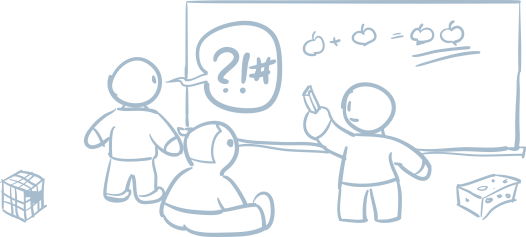
School is a setting in which children spend a substantial part of their life. It influences their mental and personal development. Aligning educational goals with this development is essential because many of its key moments take place in school.
We strive to build on our deep understanding of the child psyche and to respect the needs and patterns of the children’s growth. We try to bring education, social education, children’s school responsibilities, their formative interests, the teachers’ goals and the pupils’ needs into harmony. Teaching mathematics according to the Hejny method fully draws on the pupils’ personal potential, while encouraging, motivating and guiding their development.
The newness of a school setting, and the demands and requirements that pupils are subjected to from the beginning of their schooling experience compel them to communicate with peers and to help one another. Consciously or not, they discover solidarity and the need to belong, and they assume common attitudes and procedures. Classrooms are places where the foundations of pupils’ social interaction and social life are formed.
The main bearer of school requirements and assigner of duties is the teacher: his or her role is crucial in the above described process of formation. In common practice, this role is prevalently dominant, in some cases even oppressive. The standard collective reaction of a group of pupils is to adopt an authority-dependent strategy, or possibly a strategy of rebellion against authority, and of resistance. When a teacher adopts this approach in the long-term, the pupils’ social attitude and behavior become distorted. That distortion will project into the children’s lives outside school, with negative social consequences.
Compared with traditional teaching, the Hejny method dramatically changes the positions and roles of both the teacher and the pupils in the class. The teacher’s dominance is suppressed as he or she becomes a manager of the children’s mental work, work that largely takes the form of communication. This benefits the development of the children’s mathematical knowledge while also cultivating their natural social skills in the desired manner.
Children are attentive and sensitive to their peers. When they explain ideas to one another they are expected to try to understand the ways others may think and why an error may have occurred. This leads to better mutual understanding.
Classmates’ ideas and opinions serve as inspiration or an extension of the child’s own thoughts.
We encourage children to discuss in a civilized and unemotional manner. We use disputes and mistakes to help the entire class progress as a community. Children often experience situations in which the majority is not right. We embrace diversity of opinions.
We try to lead children towards understanding figures of authority as the architects of the pleasant and creative environment in which the activities of the class and its members take place.
Children are guided towards self-knowledge and self-assessment (e.g. in graded-problem tests).
The Hejny method leaves the fundamental creative work of mathematics up to each child. Mathematical discoveries and achievements are either the results of the child’s own activity or are revealed in conversation with peers. The pupil alone can, to a large degree, choose the level of difficulty and the extension of the problems he or she solves, and later may also choose the difficulty of homework assignments or test. The teacher supports, but does not direct, the individual pupils’ work.
It is important that pupils themselves determine the pace, direction and extent of their work. This not only positively supports their mathematical cognitive development, but also improves and enlivens their opportunities to grow and improve. The Hejny method seeks to encourage the unceasing desire to learn, and to grow, which frequently gets stifled during puberty if the changes in the child’s internal motivation are ignored. Furthermore, the method can positively influence the child’s life-long strategy.
When the learning content comes from a child’s experience, when it is matched against classmates’ opinions, and when the child is involved emotionally, the content is better perceived and compared to the child’s personal opinions and attitudes, i.e. their individual system of moral values.
In contrast, learning by mechanically connecting pieces of formal knowledge, images, and notation does not make the child think about their own system of moral values. All children believe betraying a friend is immoral, yet it is acceptable to copy test answers when the test is only the means to achieving a suitable mark in the world of formal knowledge. That world is already separated from reality. Real life, with its rules and morality, is cut off from the strange universe of school responsibilities and school knowledge.
School is a place where the work ethic and social habits of children, who later become adult citizens, evolve and develop manifestly. The fact that, in our society, the standards for knowledge are higher than the standards for morals is more serious an issue by far than that of mathematics education. Our method demonstrates, however, that good teaching can be remarkably effective in this area too.
Práce s nadanými žáky od MŠ, přes 1. a 2. stupeň až po střední školy. Zúčastněte se seminářů v Praze.